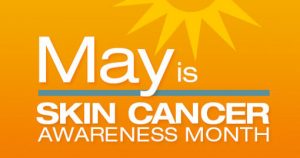
May is Skin Cancer Awareness Month. With 3.5 million cases in over two million people diagnosed annually, skin cancer is the most common form of cancer in the United States. Fortunately, skin cancer is also one of the most preventable forms of cancer.
Here are some prevention guidelines from The Skin Cancer Foundation to help you and your family reduce your risk of skin cancer:
- Seek the shade, especially between 10 AM and 4 PM when the sun is strongest.
- Do not burn. A person’s risk for melanoma, the deadliest form of skin cancer, doubles if he or she had had five or more sunburns at any point in life.
- Avoid tanning and UV tanning booths. UV radiation from tanning machines is known to cause cancer in humans. Indoor UV tanners are 74 percent more likely to develop melanoma, the deadliest form of skin cancer, than those who have never tanned indoors.
- Cover up with clothing, including a broad-brimmed hat and UV-blocking sunglasses. Clothing can be your most effective form of sun protection, so make the most of it with densely woven and bright- or dark-colored fabrics, which offer the best defense. The more skin you cover, the better, so choose long sleeves and long pants whenever possible.
- Use a broad spectrum (UVA/UVB) sunscreen with an SPF of 15 or higher every day. For extended outdoor activity, use a water-resistant, broad spectrum (UVA/UVB) sunscreen with an SPF of 30 or higher.
- Apply 1 ounce (2 tablespoons) of sunscreen to your entire body 30 minutes before going outside. Reapply every two hours or immediately after swimming or excessive sweating.
- Keep newborns out of the sun since their skin is extremely vulnerable. Sunscreens should be used on babies over the age of six months. Children are very sensitive to ultraviolet radiation- just one severe sunburn in childhood doubles the chances of developing melanoma later in life.
- Examine your skin head-to-toe every month. While self-exams shouldn’t replace the important annual skin exam performed by a physician, they offer the best chance of detecting the early warning signs of skin cancer. If you notice any change in an existing mole or discover a new one that looks suspicious, see a physician immediately. To find out more about how to perform self-examination and spot a skin cancer, visit www.SkinCancer.org/selfexamination.
See your physician every year for a professional skin exam. Call Dermatology Consultants at 651-209-1600 to schedule your annual skin cancer screening.
About the Skin Cancer Foundation
The Skin Cancer Foundation is the only global organization solely devoted to the prevention, early detection and treatment of skin cancer. The mission of the Foundation is to decrease the incidence of skin cancer through public and professional education and research. For more information, visit www.skincancer.org